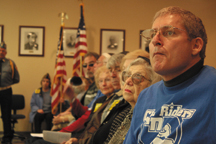For the second year in a row, the roar of engines filled Avenue C as a stream of motorcycles flowed down to Bayonne City Hall on April 19. The Chai Riders Motorcycle Club has become a vital part of the city’s annual commemoration of the Nazi Holocaust, an observance that is held in Bayonne and communities across the country on or around April 21.
The commemoration keeps alive the memory of the victims who perished during the systematic killings of millions of Europeans, particularly Jews, by the Nazis during World War II. The intent of the event is to make sure that such a tragedy never happens again.
Remembering becomes more and more difficult every year because many of the survivors of the Holocaust are passing away due to age.
“There was a time when we gathered at this ceremony to hear the survivors,” said County Executive Tom DeGise. “Now, their numbers have dwindled and we gather to remember.”
Bayonne unique
Laurie Sokol, chairwoman of the Holocaust Committee in Bayonne, said Bayonne is one of the only communities where the local government allows the ceremony to be held in its City Chambers.
Five survivors of the Holocaust took their place in the front row, the memory clear from their expressions as they listened to the speakers.
Victor and Sally Friedman, Luba Woloski, Katie Berces, and Regina Resnick, along with members of the Chai Motorcycle Club, then lighted candles in memory of the six million Jewish and five million others who perished at the hands of Nazi persecutors.
“We [all leaders] have a responsibility so that the evils of the 20th century will never happen again,” said Mayor Mark Smith, honorary chairman. “The 20th century saw tens of millions killed as a result of war and genocide.”
Smith quoted Sir Edward Gray, British foreign secretary, who said on the eve of World War I as he watched the first trial blackout of London: “The lamps are going out all over Europe; we shall not see them lit again during our lifetime.”
Smith said Gray was right. Although the first World War ended, it sowed the seeds of World War II, which unleashed more evils than the first.
“The Nazi concentration and labor camps were part of a large scale industrial war machine that killed millions,” Smith said. “We are here today to remember those that died and remembered those who survived, and those heroes who tried to save lives.”
History
The Holocaust was the systematic, bureaucratic, state-sponsored persecution and murder of about six million Jews by the Nazi regime and its collaborators. Also targeted were gypsies, the handicapped, some Slavic people, communists, socialists, Jehovah’s Witnesses and homosexuals.
Yet of all those targeted, Jews suffered the most extreme loss of life, with nearly two out of every three European Jews murdered by the end of World War II.
Although the Jewish community recognizes the Holocaust as beginning with the rise of Adolph Hitler as the dictator of the Third Reich in 1932, the mass murder began in March 1942.
When the killing ended, those who survived were released from concentration camps and came out of hiding. Vowing to keep the memory alive for future generations, the Jewish community established Yom Hashoah (Holocaust Remembrance Day), a day to remember those that suffered, those that fought, and those that died during the worst act of mass genocide in modern history. The day is traditionally observed around the date of the 1943 Warsaw Uprising.
Singing and praying
Each year, members of the Bayonne community come together to sing, pray, and recall the horrors of the Jews and other victims. More than a 30-year tradition in Bayonne, the ceremony has been held in the municipal building since 1997.
Sokol said the tradition was started in 1979 under then Mayor Dennis Collins.
Upon entering, each visitor was handed a program and a yellow Star of David, symbolic of the badges Nazis required Jewish people to wear after the start of WWII. The stars that further isolated the Jewish population and eventually aided the Nazis in rounding people up for transport to concentration and labor camps.
A special program
This year, the Holocaust Committee honored social studies teacher Gene Woods for his work with students in helping to keep the memory of the horrific events alive.
Some of his students – Joselyn Arias, David Carrero, Analisse Dunne, Thomas Jacobson and Rebecca Turner – read essays and poems in expressing their reactions to the Holocaust.
Woods and others were presented with proclamations from federal, state, county and city officials honoring their efforts.
